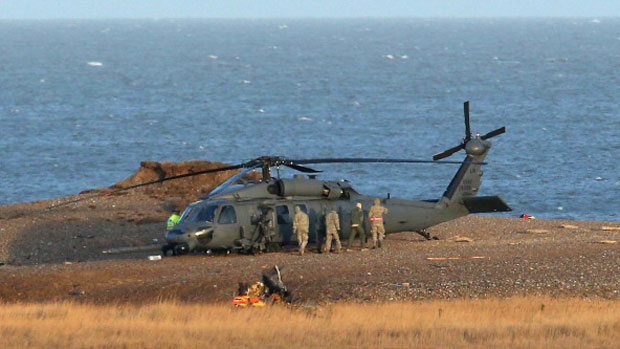Did birds cause US helicopter to crash in Norfolk marshland?
Experts say bird may have been sucked into engines of low-flying Pave Hawk before it plummeted to ground

A free daily email with the biggest news stories of the day – and the best features from TheWeek.com
You are now subscribed
Your newsletter sign-up was successful
THE US military helicopter that crashed on the north Norfolk coast killing all four servicemen onboard, may have struck a bird, aviation experts say.
The victims of the crash were named yesterday as Captain Sean Ruane, Captain Christopher S Stover, technical sergeant Dale E Mathews and staff sergeant Afton M Ponce. All four were part of the US Airforce's 48th Fighter Wing based at RAF Lakenheath.
Captain Ruane was described as "an experienced pilot", but it is not known if he or Captain Stover was at the controls of the HH-60G Pave Hawk when it crashed just after 7pm on Tuesday, the Daily Mail says.
The Week
Escape your echo chamber. Get the facts behind the news, plus analysis from multiple perspectives.

Sign up for The Week's Free Newsletters
From our morning news briefing to a weekly Good News Newsletter, get the best of The Week delivered directly to your inbox.
From our morning news briefing to a weekly Good News Newsletter, get the best of The Week delivered directly to your inbox.
A coroner has visited the site and given clearance for the bodies of the four servicemen to be removed, Sky News reports. That operation will take some time as investigators "have to take care not to disturb evidence that may form part of their probe".
The Mail says police are investigating whether a flock of geese wintering at a Norfolk wildlife reserve may have caused the crash. There is speculation that the low-flying helicopter may have disturbed the birds, causing one or more of them to be sucked into the aircraft's engines.
Aviation expert Chris Yates told the paper: "It's definitely a possibility – it could potentially be a bird strike."
Residents of Cley-next-the-Sea who heard the stricken helicopter before it crashed into marshland have described a "heavy and very unusual" sound.
A free daily email with the biggest news stories of the day – and the best features from TheWeek.com
The idea that the Pave Hawk may have been downed by a bird strike was backed up by Craig Hoyle, defence editor at Flightglobal. "They were carrying out a low flying exercise in an area where there are lots of ducks and geese, which means a bird strike is possible, Hoyle told the Mail. "Birds could definitely take an aircraft like this down, either by being sucked into the engine or even crashing through the canopy and knocking out the pilot".
As the investigation into the crash gets underway, tributes were paid to the four men from RAF Lakenheath who died.
The Mail says Captain Ruane had "fallen in love with Britain" after moving to the UK with his wife, Rachel. The couple's first child, Liam, was born in Britain and the couple liked Norfolk so much they chose to live in a rented farmhouse rather than on the military base.
Captain Ruane's father, Michael, told the Mail that his son was fascinated by British history and spent his free time visiting castles and cathedrals. His widow is "devastated" by the loss of her husband, Michael Ruane said.
Some roads around Cley-next-the-Sea will remain closed until Monday while police work alongside British and American military specialists to establish what happened.